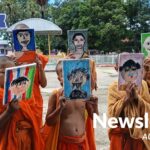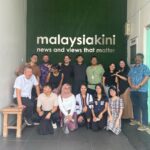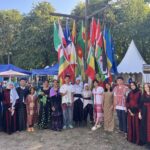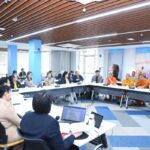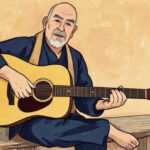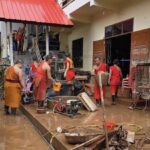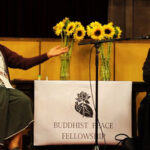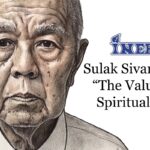?
American Protestant missionaries established the first Christian school in
Prince Damrong Rajanubhab observed that Catholics and Protestants differed in their methods of proselytization. The latter were often more humble and down-to-earth. They reached out to the masses. They got married, worked as doctors or teachers, and published books. Then when the locals began to admire them, the proselytizing process would begin. Here Dan Beach Bradley, who came to
ASSUMPTION COLLEGE |
On the other hand, Catholics were attached to their priest status and targeted the ruling elites in society. They represented themselves as the embodiment of Western know-how, which was superior to that of the Non-West, to win the hearts and minds of the ruling class?for instance, this was apparent during the reign of King Narai. However, this method also proved to be a failure in the Thai kingdom as it was in
My simple point is that Father Colombet was probably emulating the American protestant missionaries when he established Assumption College (AC). He correctly noted that as Siam was increasingly opening up to the West since the Fourth Reign, the country was in need of good schools for boys (and later girls) of birth and breeding. At first he built a small school only for Christian students. But, being the visionary that he was, he eventually enlarged the student body by admitting the enrolment of non-Christian students. This was in line with King Rama V?s desire to modernize the kingdom. On 15 August 1887, H.R.H. Crown Prince Maha Vajirunhis represented King Chulalongkorn in laying down the cornerstone for the construction of the school?s first study hall.
Along with the school, its administrative body comprised of priests must also be enlarged to guarantee its effectiveness. This would allow the administrators to have time to pray and further expand their knowledge. And
Father Colombet thus returned to
On the whole, the French missionary priests and St. Gabriel reverend brothers in
To briefly sum up, between 1903 and 1932
ived full scholarships and lived in the school?s compound. This spirit of equality was lacking in other schools, especially during the period of absolutism. For instance, at
At the same time, the school failed to reach out to the poorest strata in
The 1932 Revolution shook and divided the school. Shortly after the revolution, a number of high school students revolted against the school?s authority. It was however quickly and gently put down by the school. The revolution also meant that many royal family members who were the school?s supporters or patrons were now brandished as public villains. AC alumni were thus divided into two. Even the Vice President of the Old Alumni Association was rounded up, imprisoned and exiled to the Tarutao islands. He eventually escaped to
Brother Hilaire spoke well for the school?s position when he visited the man in Bang Kwang Central Prison. He told him not to worry about his son who was also studying at
Brother Hilaire didn?t seem to realize that the arch-enemy of the man in prison would later become the country?s premier and dictator?using Hitler and Mussolini as role models. Although Field Marshal Phibunsongkram was educated in
Fortunately, the Spanish and Italian reverends were allowed to continue running the school (because they were not nationals of enemy states). More importantly, several AC alumni also played a vital role in the Free Thai Movement such as Luang Aduldejarat, Direk Jayanama and Puey Ungphakorn. While Puey was preparing to clandestinely enter
The French missionaries returned to
* * *
To what extent has the St. Gabriel brotherhood been successful in cultivating the moral, ethical and religious development of Thai reverends? In my opinion, the Thai reverends were very successful in improving the material conditions of the school. For instance, the school was enlarged to include a commercial college and a university. Many of the Thai reverends became capable teachers and great administrators. The important question however is how many of them actually led a way of life like that of Brother Martin de Tours or matched the excellence across disciplines of Reverend Brother Hilaire.
For me, among the Thai reverends at
The great task ahead for
ntain fidelity to) the basic insight of Brother Hilaire?s timeless words, reinterpreted, crudely translated and rewritten from poetry into prose as follows:
Enlighten yourself. Open the eyes. Seek for knowledge.
Study the words of teachers and of God with alertness and diligence.
You will be prosperous with treasures in the present.
But never forget that Heaven is superior.
This appears to be a Christian teaching with a lot of Buddhist echoes. After all ?Buddha? means ?the enlightened one.? And the eyes can also refer to the Eye of Wisdom (Dhammacakkhu). ?Words of teachers? should be interpreted not as mainstream knowledge but as criticisms. In Thai the word for ?teacher? is ?kru?, which means heavy, intense, serious, strong, or substantial. Thus the teachers? words are things that we may not want to hear about ourselves or that hurt our pride but are nevertheless crucial for self-criticism and change. ?Words of God? are higher than those of our teachers or kalyanamitta. They can be found in the Bible, the Koran, sacred writings, etc. When we have learned both worldly and sacred words carefully and use them to reevaluate and improve our conducts we will accomplish great wealth in the present. Finally, ?Heaven? is higher than any worldly treasure. It does not necessarily mean the other world. Rather it refers to the proper or good path, which leads us to minimize self-attachment and serve all sentient beings. The path to ?Heaven? ultimately leads to the cessation of suffering?a blissful void.
Framed photographs of four AC alumni adorned one of the walls of Brother Hilaire?s office. They were designated as role models for AC students. These four individuals were:
1) Chao Phya Srithammathibet, the most successful of the early batches of students under the absolute monarchy; he was the last Chao Phya of old Siam.
2) Khuang Aphaiwongse, the only French major who became prime minister. Brother Hilaire did not post the photographs of other AC alumni who became premiers such as Phya Manopakornnititada and MR Seni Pramoj on his office wall. It seemed that the reverend brother did not notice Khuang?s deceitfulness and deviousness.
3) Luang Aduldejarat, an honest and trustworthy Police Chief who however was also authoritarian.
4) Direk Jayanama, a highly capable foreign minister who supported the Free Thai Movement and was very close to Pridi Banomyong. Out of these four individuals, his greatness seemed to be the least understood or appreciated by contemporary Thais.
Likewise, present AC students should learn from numerous alumni?both their strengths and shortcomings. We should further ask who else among AC alumni deserved to be honored.
If I am forced to pick only one illustrious AC alumni it would be Puey Ungphakorn. The reason for this is not because of his success at the Bank of Thailand or in the field on non-governmental development, which was of course unparalleled. Nor is it because of his honesty and humility, great love for family and wife, or involvement in the Free Thai Movement. Rather, it is because he possessed great moral courage, especially in confronting the military dictatorship. His well-known open letter to Thanom Kitticachorn (?Nai Khem Yenying?s Letter to Nai Tamnu Kiatkong, Village Headman of Thai Charoen Village?) was written in a polite manner. But it was driven by a deep and powerful sense of virtue. He wrote the letter knowing well that it would entail great personal cost. But he willingly wrote it to maintain his dignity and support the great causes of peace, democracy and justice. Therefore, he is a worthy model for present AC students.
?
Sulak Sivaraksa


